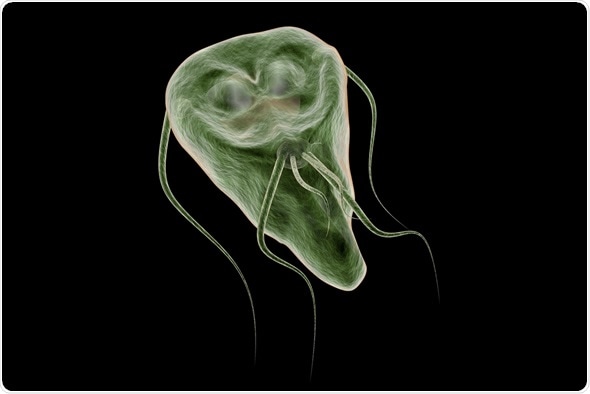Giardiasis is an intestinal infection caused by a microscopic parasite called Giardia intestinalis. It is one of the most common causes of waterborne disease in the world.

Giardia lamblia protozoan that causes giardiasis disease 3D rendering illustration - Image Copyright: fotovapl / Shutterstock
Giardia may be found in streams, ponds, lakes, and rivers, as well as in municipal water supplies, wells, swimming pools, cisterns, spas, and water parks. The parasite is found in every region of the world, particularly in areas with poor sanitation and limited access to clean water.
This infection usually resolves within a few weeks, although it can cause intestinal problems that last for some time after the parasites have gone. A number of drugs are available that are effective against the parasites, but not all individuals respond to them. The best defence is therefore prevention.
Once inside the intestines, giardia parasites form hard, protective, encapsulating shells known of as giardia cysts, which are eventually passed in the stool. These cysts enable the parasites to survive outside of the body for weeks or months. Infection is spread when these cysts are accidentally ingested, which most commonly happens after drinking water that is contaminated with infected feces. Once infection has occurred, the cysts break down and the parasites are released into the intestines.
Infection can also be spread through person-to-person contact and, less commonly, through contact with surfaces, food or objects that have been touched by an infected person who has not washed their hands properly after using the toilet. Since giardia is killed when food is cooked, contact with contaminated food is a less common mode of transmission than contact with contaminated water, particularly in the developed world.
Symptoms
Giardiasis often does not cause any symptoms and people may be unaware they are carrying the parasite. In regions where the infection is widespread, as many as one in five individuals may be infected. For people who do become ill, symptoms usually develop around one to three weeks after exposure to the parasite and may include the following:
- Watery and sometimes foul-smelling diarrhea
- Soft, greasy stools that can float
- Fatigue
- Abdominal bloating and cramps
- Flatulence
- Nausea
- Dehydration
- Weight loss
The symptoms may last for between two and six weeks, but may last longer or recur in some individuals.
Pregnant women and infants are at a greater risk of dehydration as a result of the diarrhea caused by giardiasis. For infants, dehydration can be life threatening and it is particularly important that infants are seen by a healthcare professional who can decide on the best treatment option.
Diagnosis and Treatment
Giardiasis is diagnosed through stool sample analysis. Several samples may need to be submitted because testing for the infection can be difficult.
There are many prescription medications available for treating this infection including antibiotics and medications to relieve nausea and vomiting. People are advised to stay well hydrated by drinking plenty of fluids or using oral rehydration drinks.
Further Reading
Last Updated: Feb 26, 2019